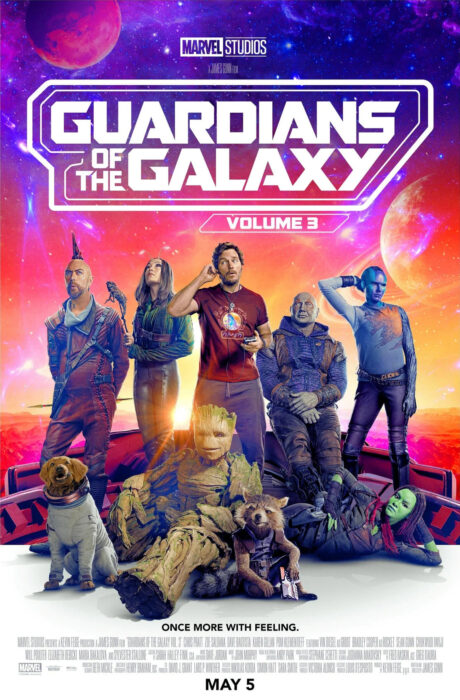‘Guardians of the Galaxy Vol. 3’ Hints at Redemption from Postmodern Pain
Tracking Marvel movie’s’ quality post–Avengers: Endgame (2019) has been an exercise in predictable decline. Until last weekend, Spider-Man: No Way Home (2021) was the only real exception to the lackluster MCU. But Guardians of the Galaxy Volume 3 is here to remind us of what Marvel used to be. Almost.
For instance, Vol. 3’s dialogue sounds like things actual people would say to each other. It is character-consistent, mostly efficient, and multilayered. This is ringing some bells.
What about the plot? Characters like Peter Quill, Drax, Groot, Gamora, Nebula, and Rocket Raccoon know what they have to do and why. Conflict is introduced in scene one and carries throughout the film. Obstacles are more than just random contrivances. Our villains are competent and driven. In fact, the Big Bad, known as The High Evolutionary, is a compelling, genius sociopath with his own flaws and insecurities.
Even the production quality is classic Marvel, with excellent visual effects and richly detailed practical sets.
All of this feels very familiar. Exhausted Marvel fans can kick off their shoes and flop onto the couch. We’re home.
Shiny spaceships can carry ideological cargo
It would be easy to say that above all of these virtues, Guardians Vol. 3 succeeds because it doesn’t preach. There are no sexually anomalous characters (save one who has been hypnotized into it for the lulz), no rants about economic socialism (looking at you, Ant-Man 3), and no sudden girlbosses there to show the silly men how it’s done.
But Vol. 3 does preach. At best the movie denounces transhumanism, that yet vaguely-defined movement to blend natural humanity with artificial intelligence, nanotech, and cryonics.
This condemnation is certainly a message Christians can get behind, because transhumanism attempts to deny God’s natural order for the sake of a salvation it will never find.
Mad science in space may reflect evil experiments on Earth
A more cynical viewer would see the High Evolutionary as the postmodern view of religion, trying and failing to make a world full of perfect lifeforms. He flies around in his version of Noah’s Ark, declaring in private that because God doesn’t exist, he has to step in. Through horrific surgery and gene manipulation (featuring some animal cruelty that might be disturbing to sensitive viewers), he pursues his elusive goal of perfection, never caring how many lives he sacrifices along the way.
Yet as I look at this man’s addiction to surgically altering the natural creatures, who holds dominion over countless corporate goons, and who specifically targets the young for clinical mutilation, I don’t see religion, or broader transhumanism. All I can see is transgender ideology.
Like transhumanism, transgenderism attempts to re-identify an individual through hack science, all the while denying the true science of natural order.
It’s notable that the High Evolutionary is deeply unwell. Even after his own bodily alterations, he is erratic and obsessive, traumatized and abusively superior. This echoes the Christian view, that many trans people are mentally and emotionally wounded, attempting to use irreversible surgery as a silver bullet for their pain—only to find it tragically magnified after the operations.
It’s probably unintentional, but in The High Evolutionary, Vol. 3 director James Gunn has illustrated transgender ideology.
Healing by ‘the hands that guided the hands’?
Thankfully, this isn’t the end of the story. Even Rocket Raccoon, after a full course of the villain’s surgical horrors and a lifetime of subsequent pain, must find healing. In the movie’s biggest surprise, Gunn actually hints at divine help for this process. “There are the hands that guided you,” one character tells Rocket, “and the hands that guided the hands.”
Who would’ve thought that Marvel’s most redemptive story of recent years would come from the Guardians of the Galaxy?
Explore more resources




































